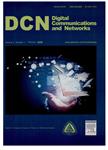Trade-off between accuracy, cost, and QoS using a beacon-on-demand strategy and Kalman filtering over a VANET
Trade-off between accuracy, cost, and QoS using a beacon-on-demand strategy and Kalman filtering over a VANET作者机构:IT Laboratory and Modelling (ILM) Faculty of Science Dhar El Mahraz (FSDM) Sidi Mohammed Ben Abdellah University (USMBA) Fez Morocco LRIT Associated Unit to CNRST (URAC 29) Faculty of Science Mohammed V University Rabat Morocco High School of Technology Mohammed V University Sale Morocco
出 版 物:《Digital Communications and Networks》 (数字通信与网络(英文版))
年 卷 期:2018年第4卷第1期
页 面:13-26页
核心收录:
学科分类:080903[工学-微电子学与固体电子学] 0809[工学-电子科学与技术(可授工学、理学学位)] 08[工学]
主 题:VANET I(alman filter GPSR Beacon on demand Estimation Routing QoS
摘 要:Vehicular Ad-hoc Networks (VANETs) have been suggested as an active and powerful field of research to mitigate environmental problems and challenges. The main challenge in a VANET is to ensure routing with a good Quality of Service (QoS). The Greedy Perimeter Stateless Routing (GPSR) protocol is one of the most promising position- based routing mechanisms used to overcome this challenge. Its effectiveness depends entirely on the information on a node's mobility and the precision of this information. By broadcasting periodic beaconing within trans- mission boundary ranges, GPSR can manage neighbors' mobility information and maintain up-to-date lists of neighbours. Nevertheless, information on the position of a neighboring vehicle quickly becomes outdated, which negatively influences the efficiency of the routing. In order to monitor information mobility and to increase the QoS in this challenging area, position estimation needs to he considered. Thus, in this study, we examine the position estimation problem, and propose an improvement to the GPSR protocol, named KF-GPSR, where each vehicle estimates in real time the position of its neighbors using the Kalman filter algorithm. Indeed, by employing this strong estimation technique, it is possible to reduce consid- erably the frequency of exchanged beacon packets, while maintaining high position accuracy. For greater reliability, we also propose an extension to KF-GPSR, called BOD-KF-GPSR, that uses the "beacon-on-demand" process only if a node needs to rediscover its neighborhood. Simulation experiments using the network simulator NS-2 are presented to demonstrate the ability and usefulness of our two proposals. Here, we compare the pro- posed protocols against diverse common protocols: GPSR, AODV, DSR, and ZRP. The results show that BOD-KF- GPSR achieves a significant enhancement in terms of its packet delivery ratio, routing cost, normalized routing load, end-to-end delay, and throughput.



